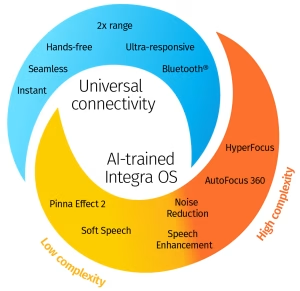

In the realm of hearing and auditory health, staying informed about groundbreaking research is crucial. At Hears to U, Audiology, we’re committed to keeping you updated on both domestic and international studies. One remarkable hub of innovation is The Hearing Institute, situated at the prestigious Institut Pasteur in Paris. Established three years ago, this research center aims to revolutionize our approach to hearing loss. This approach currently relies on hearing aids and cochlear implants. “By creating this institute dedicated to hearing, we aspire to unravel the complexities of auditory perception, offering a beacon of hope to those grappling with hearing impairment,” states the institute.
Hearing loss isn’t limited by age, posing challenges from infancy to old age. For infants, the impact is particularly pronounced, as hearing plays a pivotal role in language acquisition. Regardless of age, hearing loss has wide-ranging implications for social interactions and is linked to cognitive decline. Particularly effecting the elderly.
Luc Arnal and Diane Lazard lead the Cognition and Auditory Communication team at the Hearing Institute. They’re embarking on a mission to decipher how the brain processes intricate audio signals and adjusts behavioral responses accordingly.
Diverse factors contribute to hearing loss. Genetic factors account for 75% of infant hearing loss cases at birth. Infections during pregnancy or ototoxic drug use account for the remaining 25%. In childhood, ear infections or illnesses like measles can lead to hearing loss. Across a person’s lifetime, exposure to excessive noise and aging become predominant causes.
Alarming statistics from the World Health Organization reveal that a staggering one billion young people, aged 12 to 35, face the risk of hearing loss due to recreational noise exposure. This includes loud concerts, sports events, and prolonged use of personal audio devices playing loud music. Urban areas, now home to 56% of the global population, are witnessing a surge in noise pollution. Aziz El-Amraoui, who leads the Progressive Sensory Disorders, Pathophysiology and Therapy Unit at the Hearing Institute, explains, “We are actively uncovering the mechanisms triggering hearing loss, with noise exposure being a significant factor.
Stem cell research and gene studies are two distinct but interconnected fields within the realm of biomedical research. First, let’s define the two different methods used to help understand hearing loss.
This research focuses on understanding and harnessing the potential of stem cells. Undifferentiated cells, known as stem cells, have the ability to give rise to various specialized cell types in the body. These cells have the ability to self-renew. They can divide and produce more stem cells, and they can also differentiate into specific cell types with specialized functions. In stem cell research, scientists study the development of stem cells, their interactions with other cells, and methods to manipulate them for generating specific tissues or organs for transplantation or regenerative therapies. This field holds great promise for treating degenerative diseases, injuries, disorders and even hearing loss by replacing damaged or dysfunctional tissues with healthy ones generated from stem cells.
Gene studies, also known as genetics or genomics, focus on investigating the role of genes in health and disease. Genes are segments of DNA that contain the instructions for building proteins and other molecules essential for the functioning of cells and the body. Gene studies involve identifying specific genes associated with particular traits, conditions, or diseases. This field encompasses a wide range of research, including understanding genetic variations, mutations, and their effects on health. It also involves techniques such as gene sequencing, gene editing, and exploring the complex interactions between genes and environmental factors.
Since 2015, Christine Petit’s laboratory has delved into genetic factors predisposing individuals to noise-induced hearing loss. Her team identified a genetic condition causing early-onset hearing loss, demonstrating its impact even at lower sound levels. Collaborating with the Fundamental Mechanisms of Hearing and Precision Medicine laboratory, along with Paul Avan, a renowned physician, biophysicist, and audiology expert, they’re conducting a comprehensive study in partnership with the French Armed Forces Biomedical Research Institute (IRBA). This research aims to unveil genes linked to noise vulnerability and biomarkers indicative of underlying conditions. Paul Avan heads The Center for Research and Innovation in Human Audiology (CERIAH) at the Hearing Institute.
At the forefront of stem cell research, Raphael Etournay spearheads the Cochlear Development and Therapeutic Prospects group at the Hearing Institute. They’re harnessing stem cells to cultivate tiny organoids, about 1-2 mm in diameter, composed of sensory cells from the inner ear’s balance organ. Researchers are now extending these miniature structures to incorporate auditory cells. This innovation holds promise for testing novel therapies by screening for gene therapy viral vectors or substances that trigger auditory cell regeneration.
According, to this body of research, published on March 18, 2021, these studies encompass gene therapy investigations and the development of protocols employing psychoacoustic perception tests and electrophysiological measurements to assess hearing in individuals both with and without hearing loss. Some individuals unaffected by hearing loss still encounter difficulties in specific sound environments, necessitating precise hearing assessments. According to Dr. Avan, these protocols will prove invaluable for diagnostics, therapy monitoring, sound pollution measurement, and enhancing our comprehension of auditory perception and cognition.
Stem cell research and gene studies often intersect when investigating conditions influenced by both genetic factors and cellular processes. By studying stem cells to model diseases in the laboratory, allows understanding on how genetic mutations contribute to disease development. Additionally, gene editing techniques can be applied to stem cells to correct genetic mutations before using them for regenerative therapies. As such, these fields collaborate to enhance our understanding of disease mechanisms, in our case hearing loss and develop novel treatments.
We are looking forward to learning more about solving the mysteries and hopefully, some corrective measures in hearing loss, even if just for a genetic population as it is a start. Stay tuned as we find more research in the world around us.
Cheers.
Powered By SinglerDesign.com